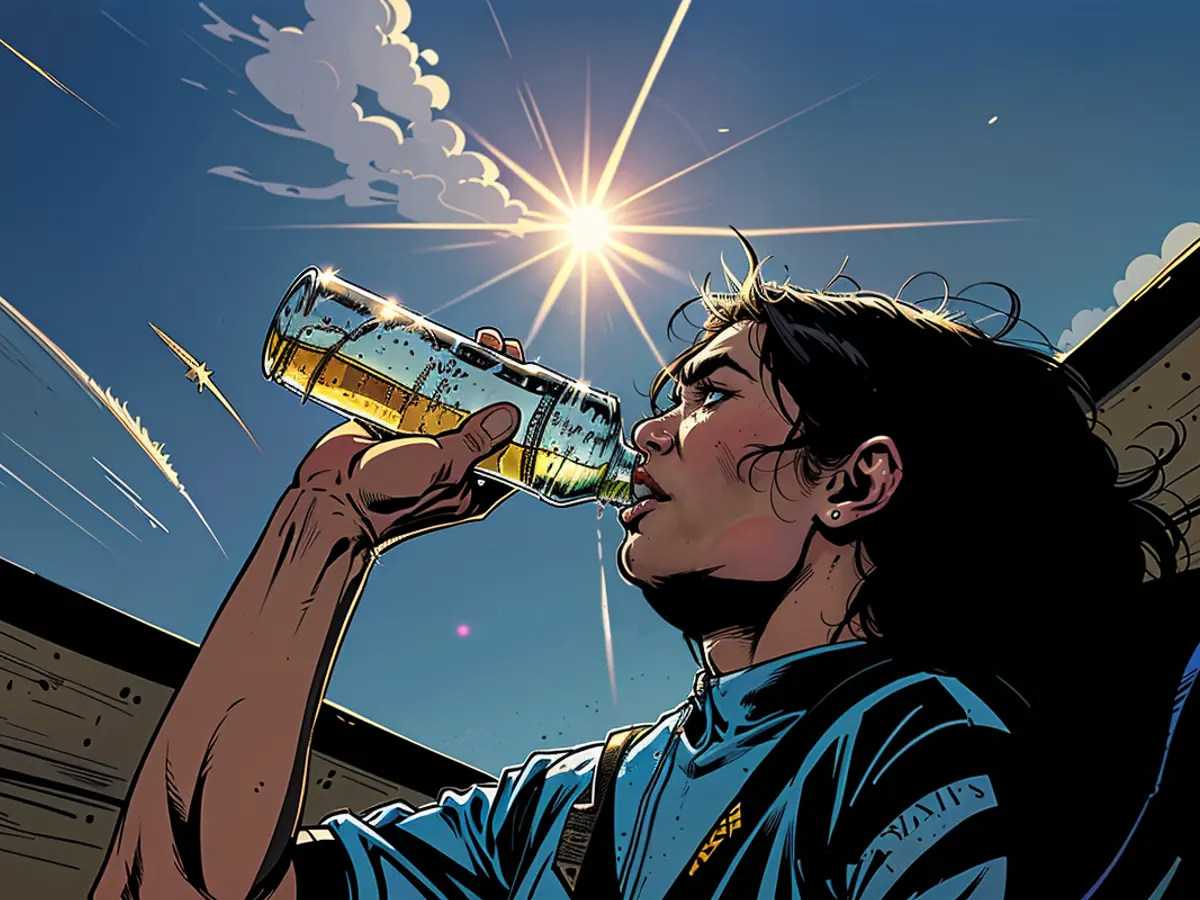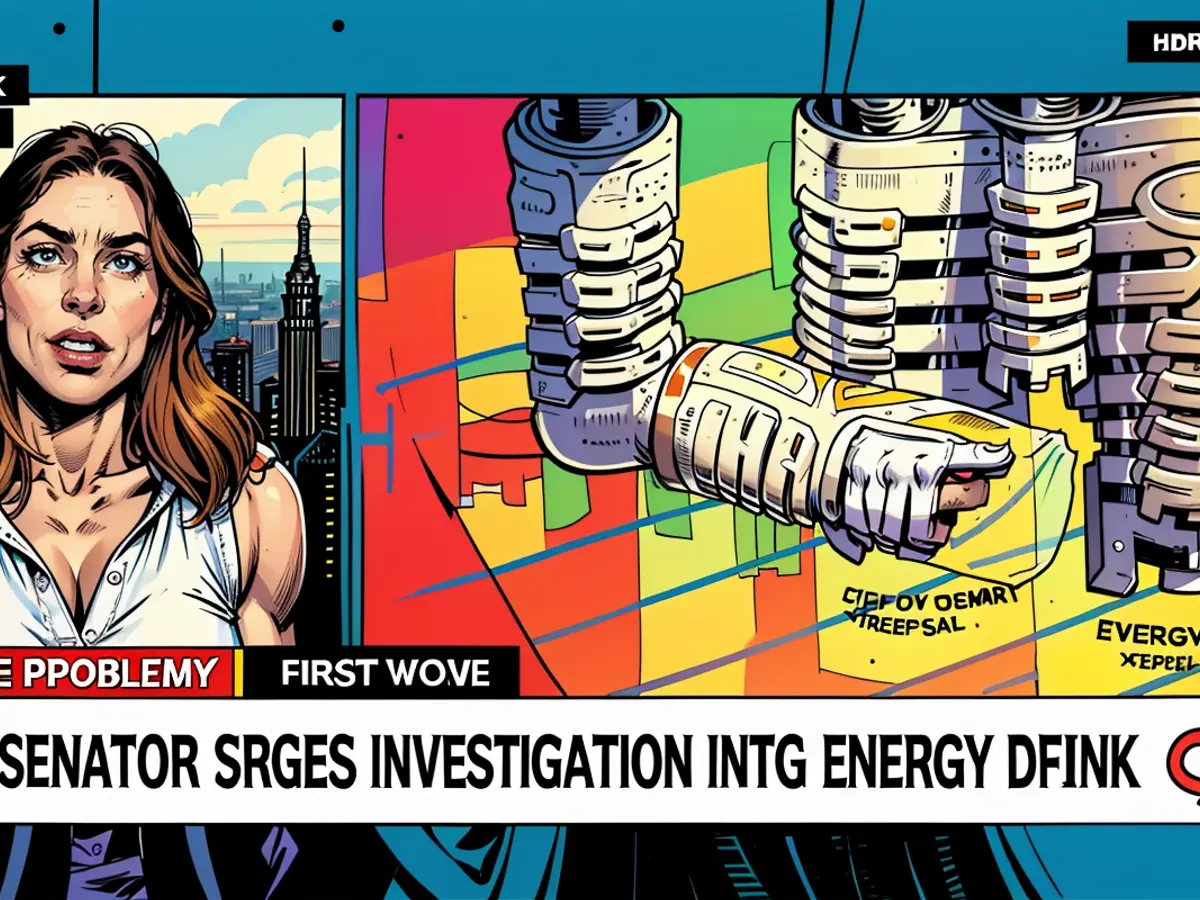In scorching heat, water stands out as the optimal hydration choice.
Americas are facing a severe heatwave that's been lingering for days on end, breaking records nationwide.
Staying hydrated is crucial during these scorching summer days, but is water still the ideal drink during a heatwave, or should folks opt for sports drinks instead? What about sodas, coffee, beer, and other beverages - are they safe to consume in excessive heat?
To unravel the puzzle of suitable and avoidable drinks during hot weather events, I chatted with CNN's health and wellness expert, Dr. Leana Wen. She's an emergency physician and clinical assistant professor at George Washington University. Formerly, she served as the health commissioner of Baltimore.
CNN: What quantity of water does one typically consume daily, and does that change in extreme hot weather?
Dr. Leana Wen: The commonly cited guideline is the “8 x 8 rule,” which implies drinking eight 8-ounce glasses of water (64 ounces) each day for adults. This equals half a gallon. However, it's important to note that this rule isn't absolute. Factors like diet, body size, and physical activity affect water intake. Additionally, humidity levels, air temperature, and duration spent outdoors during hot weather influence hydration requirements. Adults engaging in physical activity outdoors for extended periods in hot weather should consume around an 8-ounce cup of water every 15 to 20 minutes based on the CDC guidelines. This translates to around 24 to 32 ounces every hour. It's vital to maintain hydration not only during outdoor activities but before and after as well.
CNN: Can one drink too much water?
Wen: Indeed, it is possible to overhydrate. The CDC advises against consuming more than 48 ounces (1.5 quarts) of fluids, including water, in an hour. Drinking excessive amounts of fluids all at once can dilute the concentration of salts in our bloodstream, which can be harmful.
CNN: When the heat is scorching, is water still the best choice, or should people go for sports drinks?
Wen: Sports drinks are beverages fortified with electrolytes. They help replenish lost water and electrolytes due to sweating. These drinks contain electrolytes such as sodium, potassium, calcium, and magnesium. Some sports drinks also contain sugars such as fructose, glucose, and sucrose.
Most people do fine with just water. People engaging in moderate physical activities and kids playing outdoors or participating in after-school sports do not usually require electrolyte replacement. Typically, the foods we eat provide the necessary electrolytes.
Athletes participating in intense outdoor activities for over an hour during hot weather might consider sports drinks, but even then, not everyone requires electrolyte replacement beyond what they obtain from their normal diet. This depends on factors like the amount they sweat, the temperature and humidity of the environment, and the intensity of their exercise.
CNN: Is it better to use a pre-made sports drink in a bottle or an electrolyte powder to make your own drink?
Wen: Personally, I prefer the powdered option. There are also tablets that dissolve in water. These DIY alternatives are usually less expensive, and I like to choose brands with minimal added sugar and chemicals. Ultimately, it's a question of preference, but whatever you choose, carefully study the ingredients. For instance, if you prefer low sugar and no caffeine, ensure your drink doesn't contain these ingredients.
CNN: What about energy drinks? Are these a suitable alternative to water?
Wen: Energy drinks should not replace water. They should be used cautiously in adults, and kids should not consume them.
Energy drinks differ from sports drinks, which are designed to help rehydrate and replenish electrolytes. Energy drinks primarily contain caffeine and other legal stimulants like L-carnitine and guarana. While caffeine offers short-term energy boosts, it also acts as a diuretic, causing dehydration. Excessive caffeine consumption may lead to jitteriness, anxiety, and irregular heartbeats.
The American Academy of Pediatrics recommends avoiding energy drinks for children and teenagers. Some studies suggest that up to 50% of adolescents have consumed energy drinks. I encourage parents to be mindful of the difference between sports drinks and energy drinks, with energy drinks particularly requiring caution.
CNN: What about other caffeinated drinks like coffee? Is an iced brew or mocha a bad idea during hot weather?
Wen: Not necessarily, but people should be aware that caffeinated beverages like iced coffee may not hydrate as effectively and might even lead to further dehydration. This doesn't mean you should abandon all coffee during hot weather. Just be mindful of the impact of caffeine and consider drinking extra water while enjoying caffeinated beverages.
CNN: What about carbonated drinks, punches, and alcoholic beverages?
Wen: Carbonated drinks and punches are classified as ultra-processed foods, which have been linked to several long-term negative health outcomes, including diabetes, heart disease, and an increased risk of early death. Consumption should generally be limited, with water being the preferred choice for hydration during hot weather.
Aussiedlerbote: Steer Clear of Booze in Sweltering Weather Be Wary of Overindulgence, Especially in Scorching Heat!
You're better off avoiding liquor when the temperature soars high. Be mindful not to get wasted, as that could hamper your body's ability to regulate its temperature. Plus, you might miss crucial indications of heat-related disorders. Alcohol can lead to dehydration too. If you still opt for alcohol, keep your drinks in check, ensure you're among folks who can help in case of medical emergencies, and don't forget to guzzle loads of non-alcoholic beverages.
USA Today: Got Small Athletes Attending all-day Sports Camps?
Can't give a straightforward response without knowing the camp's specifics. Many sports camps provide indoor activities for at least some part of the day, and even those mostly outside should shift their activities indoors during severe heat advisories.
When unsure, reach out to the camp's director and inquire about the time spent outdoors. If outdoor time is minimal, there are frequent breaks, and the activities are primarily low to moderate intensity, it's likely enough to stay hydrated with water and top up with nutrient-rich snacks such as watermelon, coconut, and avocado. Also, focus on hydrating before and after camp. Sports drinks might not be essential, and, once more, children should avoid energy drinks.
USA Today: What Other Safety Measures should be taken in Extreme Heat?
Wen: Familiarize yourself with heat exhaustion and heatstroke symptoms. Take special care of kids, the elderly, and those with long-term medical conditions that may be worsened by the heat. Be cautious while working out and try to conduct activities indoors or during early mornings or late evenings. And, remember, the best liquid for hydration is H2O!

Read also:
During our conversation, Dr. Leana Wen stressed the importance of maintaining proper hydration during extreme heat, especially during outdoor activities. She suggested adult individuals engage in physical activities for extended periods should consume around 24 to 32 ounces of water every hour, following CDC guidelines. Furthermore, she advised that wellness-conscious individuals looking for an alternative to sports drinks can opt for electrolyte powders or tablets to create their own hydration beverages.








